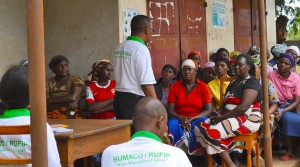Once again Chinua Achebe, one of the most, if not the top African writer, has brought into the literature another type of non-fiction genre. In this book, Achebe coherently presents his personal experience of colonial Nigeria, post-colonial Nigeria, Biafra War, and politics after the war. Although most pages are dedicated to the Biafra War, the book provides a detailed context of pre-war and post-war Nigeria. Seemingly, life in Nigeria was good during colonial times especially for children of the Christian parents such as Achebe’s. British colonial government set up standard schools and selections to enter those schools were based on merits (perhaps ‘relative’ merit). It was for this reason that Achebe argues that they felt well prepared to run the country because they had received an outstanding education (p.49). But may be only a few felt the same way. Things changed upon the independence when the colonial authority manouvered the first election by placing a person who my friend in reference to Plato would call a “lesser” to lead Nigeria (pp.48-52). Having “lesser” leaders in the new nation hindered efforts for nation building and opened doors for hatred, lust for power, ethnicity, and many other killer viruses in nation building. Only 6 years after the independence Nigeria found itself in a civil conflict that was nothing short of genocide (pp.228-232). The Biafra war composed of systematic ethnic cleansing and one of the worst humanitarian crises.
In his perfect literary style, Achebe gives an account of first hand experience of the war. He was a victim. In many angles. A Igbo man. A writer. A Biafran ‘state’ diplomat. Thus the pages of the book carry a disturbingly personal story on “things falling apart” yet easy to read thanks to Achebe’s magic writing hand. In this, we learn the importance of keeping a diary of our daily life experience. It is a way of writing our own history. The account of the war in this book narrates what Achebe saw in his own eyes. In fact, very wisely Achebe wrote the story as it was and then sought for analysis or explanation after. For example, when he narrated about the joy and dancing following Mwalimu Nyerere’s recognition of Biafra, he gave a picture of what he saw even from his wife and later on he gives an analysis of the significance of Nyerere’s recognition. At this point I must say how proud again (as ever) I am to be a Tanzanian, a country that stood for humanitarian principles despite the OAU (Organisation of African Unity) stance.
Well, in connection to the above, I can vividly say that Achebe tried to be as objective as possible. This is why he is critical to some of Ojukwu’s decisions and actions. Achebe was definitely pro- secession of Biafra and he has clearly explained why, but he was not a kind of a “Yes Master flag follow the wind” type.
One of the big lessons in this book is the role of writers and the power of writing. Achebe dedicated many pages in showing how committed writers not only influenced politics of the day but also predicted what will happen. For those who think writing is not effective, here is a quote for them from Achebe:
There are some who believe that the writer has no role in politics or the social upheavals of his or her day. Some of my friends say “No, it is too rough there. A writer has no business being where it is so rough. He writer should be on the sidelines with his notepad and pen, where he can observe with objectivity.” I believe that the African writer who steps aside can only write footnotes or a glossary when the event is over. He or she will become like the contemporary intellectual of futility in many other places, asking questions like: “Who am I? What is the meaning of my existence? Does this place belong to me or to someone else? Does my life belong to me or some other person?” These are questions that no one can answer. pp. 55-56.
Uuugh, the pinching thing is that Achebe criticizes Ali Mazrui’s work “The Trial of Christopher Okigbo” immediately after the above paragraph… no other comments from me!
That aside, the power of Achebe’s writing is evident in the ability to engage our emotions and feelings. His friendship with Okigbo was admirable and I felt very sad upon his lose of life. Similarly, his explanation of Azikiwe writings or his meetings with Senghor brought them very close to me as if I knew them in person already.
The poems at the end of some tough and painful sections made it easy to move on to another section. They were like refreshing or tear wiping white cloth clearing the eyes for next pages.
In summary, Achebe’s writing talent lived with him to his old age. From his first novel, Things Fall Apart to this very last book in his life-time, Achebe has never let his readers down. I am personally grateful for this wonderful non-fiction book, which provides a primary account of one the painful scars of Africa.
One question though: the title of the book “ There Was A Country”… does it mean Biafra or Nigeria? Because the book starts with a narration of a brilliant Nigeria and ends up with a corrupt full of trouble Nigeria….! I, however, think the title means Biafra because of its subtitle A Personal History of Biafra.
Well, I will end here so I can write my diary before sleep takes me over…may be one day this diary will account for personal history of …? What! #BungeLaKatiba…ooh no…may be of Professor Hunk…lol! ouuch
